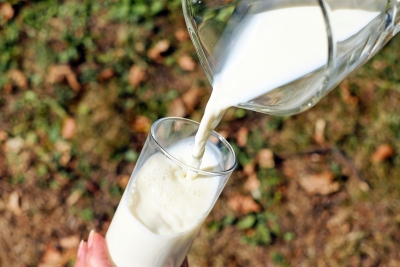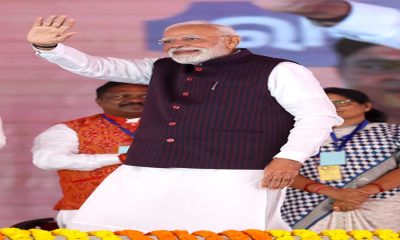Business
Buffalo milk prices rising in Mumbai from March 1, will have cascading effect

The buffalo milk wholesale prices in Mumbai will shoot up by Rs 5/litre from midnight on Tuesday and could trigger a significant cascading effect on the entire food industry that depends on it as its raw material, milk industry players say.
Portending a hard hit, the Mumbai Milk Producers Association (MMPA) last Friday announced the steep hike in wholesale price of buffalo milk.
The bulk milk prices will go up from Rs 80/litre to Rs 85/litre and will remain in force till August 31, MMPA Executive Committee Member C.K. Singh said.
This will be followed by a similar increase in the retail market by the 3,000-plus retailers in Mumbai for the creamy fresh buffalo milk, which would now sell at around Rs 90 per litre – up from the current Rs 85 per litre – from March 1.
These sharp hikes shall be borne by the ordinary consumers not only in the form of dearer plain milk, but also other milk products that are consumed by households daily.
“This would impact, albeit marginally, the rates of a cup of tea-coffee-ukala-milkshakes, etc, served by restaurants, at the ordinary pavement vendors, or in small eateries,” said MMPA Treasurer Abdul Jabbar Chhawaniwala.
The duo said that there are many other milk products like khoya, paneer, sweetmeats like pedha, barfi, certain north Indian or Bengali sweet varieties which are milk-based which could witness a price hike now.
Prominent milkman in north Mumbai, Mahesh Tiwari rued that the price hike has come on the eve of certain festivals and also the big fat weddings season, which would be hit by the whole-sale milk price hike from Wednesday.
“The demand for milk and milk products goes up at least 30-35 per cent during festivals and even higher for weddings, marriages and other social events, and the new rates would be applicable,” he said.
There’s a string of festivals like Holi, Gudi Padva, Ram Navami, Mahavir Jayanti, Easter after Good Friday, Ramzan Eid, and others in the next couple of months where the celebration budgets would have to be expanded, says Singh.
The hike has been necessitated to offset the increased prices of milch animals as well as their food items like dana, tuvar-chuni, chana-chuni, makai-chuni, udad-chuni, green grass, rice grass, hay, which have seen steep price rises by 15-25 per cent in the past few months, Singh said.
“Inflation has become unbearable, many of the items that make buffalo feed are almost wasted, but we have to buy them at higher rates from the market. So the milk price hike was inevitable, though done reluctantly,” rued MMPA General Secretary Kasim Kashmiri.
Singh avers that normally, any fluctuation in milk prices in Mumbai is usually followed by an increase in milk rates in the rest of the country, too.
On an average, Mumbai consumes over 50 lakh litres of buffalo milk daily, of which more than seven lakh is supplied by the MMPA through its chain of dairies and neighbourhood retailers, through their farms spread in and around the country’s commercial capital.
This is the second major hike by MMPA after September 2022 when the buffalo wholesale milk prices was jacked up from Rs 75 per litre to Rs 80 per litre, making domestic budgets of poor and middle-class families go haywire.
Incidentally, in February 2023, all the major cow milk producers’ associations in Maharashtra, along with other major branded producers, have hiked the prices of cow milk by at least Rs 2 per litre.
Business
ED Seizes ₹42 Lakh, Luxury Cars In Mumbai Drug Money Laundering Probe

Mumbai: The Enforcement Directorate (ED) seized Rs 42 lakh in cash, three luxury cars, property papers, and several digital devices during a search operation on Wednesday targeting a drug trafficking and money laundering network. The agency also froze multiple bank accounts and a locker linked to alleged drug trafficker Faisal Javed Shaikh and his wife, Alfiya Faisal Shaikh.
Officials said the searches were conducted at nine locations across Mumbai under the provisions of the Prevention of Money Laundering Act (PMLA), 2002. The operation aimed to trace the drug sale proceeds generated by a well-established narcotics network allegedly operated by the couple.
The ED initiated its money laundering probe based on a case registered by the Narcotics Control Bureau (NCB), Mumbai Zonal Unit, against multiple accused, including Faisal Shaikh, Alfiya Shaikh, and several others, including Ashik Varis Ali, Nasir Khan, Irfan Yusuf Faruqi, Azim Abu Salim Khan alias Azim Bhau, Faizan Mohd. Shafi Shaikh, and Mohd. Shahid Faridudin Chaudhary alias Baboos.
Investigators said Faisal Shaikh was procuring MD (Mephedrone) drugs from Salim Dola, a notorious drug kingpin who has been wanted by law enforcement agencies for his alleged role in large-scale narcotics trafficking. The NCB has announced a reward for information leading to Dola’s arrest.
After securing bail in the NCB case, Shaikh, described by officials as a habitual offender, was placed under preventive detention under the PIT-NDPS Act.
The ED’s probe revealed that Faisal and Alfiya Shaikh allegedly ran a structured network for the sale of MD drugs sourced from Dola. During Wednesday’s searches, the agency also covered premises connected to several individuals associated with shell companies with paper transactions exceeding Rs 100 crore, as well as firms involved in foreign outward remittances and financial dealings with the accused. Officials said these entities are being examined for their possible role in layering drug proceeds and routing the funds abroad through channels such as hawala, shell companies, and trade-based mis-invoicing.
Officials said the ED searches were critical to tracing both the “forward linkage” (movement of drug sale proceeds) and “backward linkage” (sources, beneficiaries, and conduits of funds), including whether the proceeds were channelled abroad via hawala, shell companies, or trade mis-invoicing. The seized and frozen assets including cash, bank accounts, lockers, vehicles, property documents, and digital devices are being examined under the lens of money laundering.
Business
Stock markets end week on positive note; Banking, IT, and pharma stocks lead gains

Mumbai, Oct 11: Indian equities ended the week on a positive note amid buying in banking, IT, and pharma stocks (in the last two sessions).
Investors’ sentiment remained firm toward banking stocks during the period, buoyed by the RBI monetary committee decision to keep the repo rate unchanged at 5.5 per cent, and it improved further after the government invited private sector professionals to lead the State Bank of India.
Meanwhile, pharma stocks picked up momentum at the end of the week after the US administration said that they do not plan to impose tariffs on generic drugs and signalled cutting biotech ties with flagged foreign firms, especially from China.
“Pharma stocks rallied as the US revived the Biosecure Act, aiming to cut biotech ties with flagged foreign firms, especially from China, providing a strong boost to Indian CDMOs. With the earnings season underway, investors are closely watching quarterly results for cues on market direction,” said Vinod Nair, Head of Research, Geojit Investments Limited.
On Friday, Indian equity benchmark indices ended higher for the second straight session, supported by strong buying in pharma and banking stocks.
Because of the weakness in IT stocks, the Sensex opened at 82,07,5 down about 100 points. But it quickly bounced back, rising 579 points to an intra-day high of 82,654.
At 82,501, the index ultimately closed 329 points higher, or 0.4 per cent higher. Likewise, the Nifty reached a peak of 25,331 during the day and ended the day 104 points, or 0.4 per cent, higher at 25,285.
“Investor sentiment improved after the government invited private sector professionals to lead the State Bank of India. This marks a broader policy shift towards allowing private participation in public sector enterprises, aimed at enhancing efficiency and governance,” Nair added.
The Nifty index displayed strong bullish momentum over the past week, advancing 391 points or 1.57 per cent, while Sensex rallied over 1,000 points or 1.35 per cent.
“On the weekly chart, the index has formed a cup and handle pattern, and a decisive break out of this formation, supported by increasing volumes, would signal the potential for further sustained upside,” said Hardik Matalia of Choice Equity Broking.
The Bank Nifty (up 1.84 per cent), Nifty IT (up 4.8 per cent) and Nifty Pharma (up 2.12 per cent) fueled the market momentum this week.
Business
Sensex, Nifty edge higher as geopolitical tensions ease

New Delhi, Oct 10: Indian stock markets opened on a flat note but soon moved higher on Friday, supported by positive global sentiment.
The easing of geopolitical tensions in the Middle East and signs of a possible trade deal between the US and India boosted investor confidence.
After the opening bell, the Sensex gained 148 points, or 0.18 per cent, to trade at 82,320 levels. The Nifty also rose 40 points, or 0.16 per cent, to 25,221 levels.
“Though yesterday’s push higher in the second half failed to clear the week’s high, it did serve to invalidate the bearish bias of the evening star candle stick pattern,” market experts said.
“This encourages us to look for 25460, in the days ahead. For the day, inability to push and float above 25215 or direct fall past 25113, could render the trend sideways, but may not call for a break of 24982 right away,” they added.
In the broader market, the Nifty Midcap 100 index inched up 0.18 per cent, while the Nifty Smallcap 100 advanced 0.28 per cent — indicating healthy participation from mid- and small-cap stocks.
Among the sectoral indices, Nifty Metal was the worst performer, slipping 1.4 per cent. It was followed by weakness in Auto, Pharma, and Healthcare stocks.
On the other hand, sectors such as Banking, Energy, FMCG, IT, Consumer Durables, Oil & Gas, and Realty were trading with gains.
In the Sensex pack, Power Grid, State Bank of India, NTPC, Adani Ports, and Asian Paints were among the top gainers.
Meanwhile, Tata Steel, TCS, Bajaj Finance, M&M, and HCL Tech were trading in the red.
“The overall market environment is turning positive. Globally, the GAZA peace accord signals end to the conflict and reduction of geopolitical risk from the region,” analysts said.
“Domestically, there are indications of a trade deal between US and India with India ‘rebalancing’ its oil purchases,” they added.
According to market analysts, these positive developments and the shift in FII strategy ( FIIs were buyers in the cash market in the last three trading days) bode well for the market.
-

 Crime3 years ago
Crime3 years agoClass 10 student jumps to death in Jaipur
-

 Maharashtra1 year ago
Maharashtra1 year agoMumbai Local Train Update: Central Railway’s New Timetable Comes Into Effect; Check Full List Of Revised Timings & Stations
-

 Maharashtra12 months ago
Maharashtra12 months agoMumbai To Go Toll-Free Tonight! Maharashtra Govt Announces Complete Toll Waiver For Light Motor Vehicles At All 5 Entry Points Of City
-

 Maharashtra1 year ago
Maharashtra1 year agoFalse photo of Imtiaz Jaleel’s rally, exposing the fooling conspiracy
-

 National News1 year ago
National News1 year agoMinistry of Railways rolls out Special Drive 4.0 with focus on digitisation, cleanliness, inclusiveness and grievance redressal
-

 Maharashtra11 months ago
Maharashtra11 months agoMaharashtra Elections 2024: Mumbai Metro & BEST Services Extended Till Midnight On Voting Day
-

 National News1 year ago
National News1 year agoJ&K: 4 Jawans Killed, 28 Injured After Bus Carrying BSF Personnel For Poll Duty Falls Into Gorge In Budgam; Terrifying Visuals Surface
-

 Crime12 months ago
Crime12 months agoBaba Siddique Murder: Mumbai Police Unable To Get Lawrence Bishnoi Custody Due To Home Ministry Order, Says Report






















